This International Women’s Day we’ve spoken to some of the women of Qantas about the interesting aviation careers they’ve shaped for themselves.
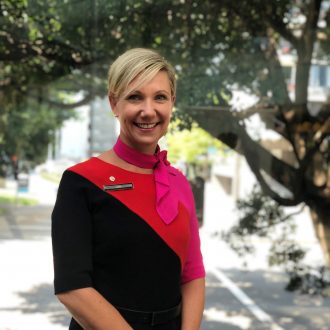
Cate Parsons, Cabin Crew
Cate Parsons joined Qantas in 1999 as an International Flight Attendant before moving to our regional airline, QantasLink. “QantasLink is like one big happy family – that counts for colleagues, and customers too. I love that regional flying means we have so many regular customers we get to know on a firstname basis. I truly haven’t felt like I’ve ‘worked’ a single day since I started flying.”
“I think my role offers a great work/life balance. My husband is also a Qantas Cabin Crew member and when I returned to work after the birth of our second daughter, we both moved into part-time positions so we could split the time flying and time with our daughters.”
“Shift work like ours can provide the opportunity for partners to share the load of responsibility both at work and home. When I return home from the job I love to see my family’s everyday routine continuing and my children spending quality time with their dad, I feel so grateful to have found that balance.”
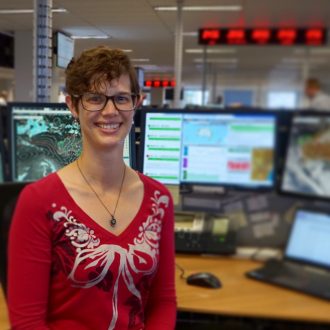
Charlotte Gabites, Meteorologist
Charlotte Gabites and her team help pave the way for clear skies and smooth flights. As Qantas’ Meteorology team leader, she assesses the weather everywhere a Qantas plane flies across the globe, flagging risks like thunderstorms, fog, snow, crosswinds, cyclones and volcanic eruptions. She helps flight dispatchers and pilots re-route or plan around bad weather.
“Because we cover such a large geographic area, I could be dealing with multiples types of weather across the world on any given day, often at the same time. When things start happening there’s a lot of quick decision-making to be done. I love that I’m always learning. So much goes on behind the scenes of an airline and it’s fascinating seeing it all come together.”
“I have a Bachelor of Science degree in Meteorology and worked for 10 years as a forecaster in Canada before moving to Australia. Being a scientific field, there are fewer women meteorologists, but that’s finally changing. Women are just as capable as men in STEM professions, so there’s no reason there shouldn’t be balance.”
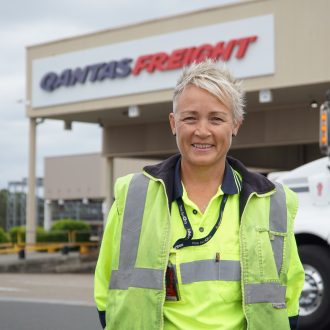
Chookie, Qantas Ground Services
Anne Marie Csuka says she’s always been an outdoorsy person and has found herself in operational roles throughout her career. “I just love it”, says Anne Marie, known affectionately as ‘Chookie’ by her colleagues in the Qantas Ground Services team.
Recently moving from Mail Handling to work on the tarmac at the Qantas Freight International Terminal, she helps load and unload cargo.
Chookie was the first woman to join Qantas Ground Services. “The guys were really welcoming. It’s the kind of team where everyone pitches in to get the job done, and everyone adds their two cents. We all have our say and it’s nice to be treated equally.”
She’s always been drawn to roles where she’s working with tools and machines and says girls shouldn’t be put-off by the traditionally masculine environment, “Just give it a go and you might find that you love it.”
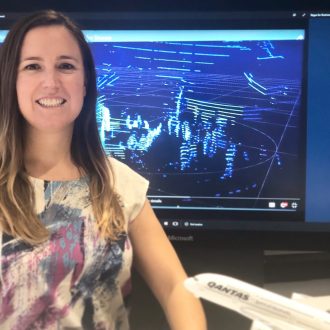
Natalie Ganderton, Emerging Technology
Natalie Ganderton is an Emerging Technology Lead, finding the latest advances in technology and looking at innovative ways to harness them to solve problems and do things we’ve never done before. From exploring uses for augmented and mixed reality, to Lidar (a laser light distance measuring tool), Natalie’s always focused on the next big thing, “I really love staring into the future and imagining what travel could like for our customers in years to come.”
Natalie studied Engineering Science at university. “I’ve always been interested in practical applications of maths and science, and I think technology is a perfect manifestation of that – nowhere more so than in the aviation industry. Maths, science and technology come together to defy nature every time an aircraft takes off and lands – I still find it nothing short of miraculous.”
Natalie’s passionate about diversity in tech and encouraging girls to consider a career in IT and take up coding during their school years. “Diversity is crucial in technology, particularly identifying where gender, experience or racial bias could be present in the datasets we use and risk creating biased models or outputs.”
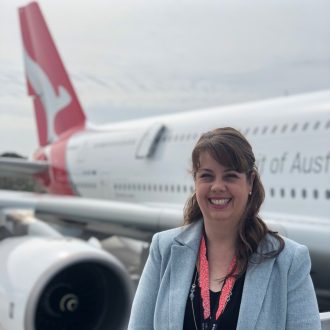
Jaclyn Kinnane, Airport Manager
Over the past 20 years at Qantas, Jaclyn Kinnane’s career has taken her to Dubai, Dallas and now Los Angeles. As Qantas’ Los Angeles Airport Manager, her job covers everything involved in turning around an aircraft from its arrival to next departure – catering, customer service, finance, working with government agencies and more. “Working in the US, I love flying the Australian flag,” says Jaclyn. “The coolest part is seeing our red tail every day and knowing we’re helping to create special memories for our customers.”
“Aviation has traditionally been a male-dominated field, particularly in leadership roles, but that’s really changing. I once read that men and women are equal, not identical, and I couldn’t agree more. Gender balance is so important in aviation and operational roles because it makes room for a diversity in opinions and ways of thinking.”
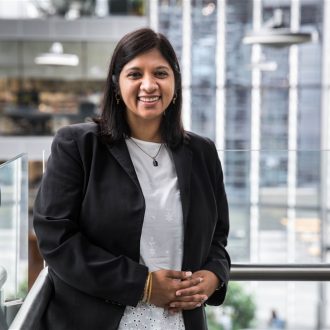
Kash Chanderjith, Facilities Management
Kash Chanderjith is a Manager of Operational Excellence in Qantas’ facilities management team, responsible for keeping our hangars, offices, workshops and lounges in top shape. Starting as a Chartered Accountant in Johannesburg, Kash’s career has stretched from finance to operations, and taken her from the depths of mines to the tarmac.
She was named South African Woman of the Year in 2012 and is an advocate for diversity in the workplace on multiple fronts, “I’m profoundly deaf and throughout my career I’ve worked in traditionally male-dominated environments. It’s challenging trying to break the mould, but I’ve really embraced my differences as an opportunity to change people’s expectations of what someone in a certain role should be like. Each time I’ve succeeded at work, I’ve been proud to know I’m redefining what people think I’m capable of.
An important lesson I’ve learned is that when women band together to support each other at work, we all get further.”
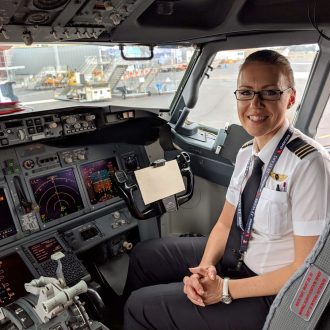
Jade Vincent, Pilot
Jade Vincent’s first taste of flying came at 15 years old when she experienced a landing from the flight deck of a Boeing 767. She went on to become a First Officer on that same aircraft and twenty-six years later says there’s still nothing more satisfying than the “perfect powder puff landing”.
“Being a pilot is about working together with a huge team of professionals to get people where they want to go safely and on time,” she says. She’s certain pilots have the best office in the world and a job full of challenge and satisfaction – not to mention rockstar appeal among her kids’ friends.
“It took me years to finally see myself as an equal with the men in my job. I had strong support from other women, and now that I truly feel equal, I hope the next generation of women see themselves as equal right from the start. I want to give them the same support I had.”
Her advice to girls who want to become pilots? “You can do it. It seems overwhelming, but just approach it one step at a time with the right support.”
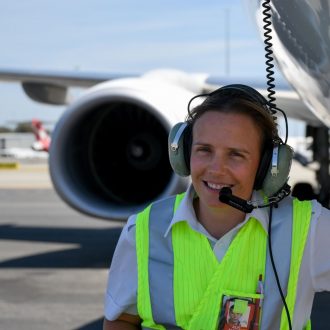
Jodi Bruce, Engineer
For Jodi Bruce, one of Qantas’ Licensed Aircraft Maintenance Engineers, no day is the same. Whether it’s fixing the inflight entertainment, working on the navigation system or repairing an aircraft’s engine so it can take off again, “Aircraft are so complex and involve thousands of working parts. Some days you’ll come to work and be flown to remote parts of Western Australia to fix an aircraft and bring it back to Perth, and some days you might be in the hangar doing routine servicing.”
When it comes to encouraging more girls and women to consider a career in engineering Jodi says, “some people think engineering is only for boys because you get dirty or the tools are too heavy – that’s definitely not the case.” She believes it’s important to encourage girls to do what makes them happy and fuels their passion.